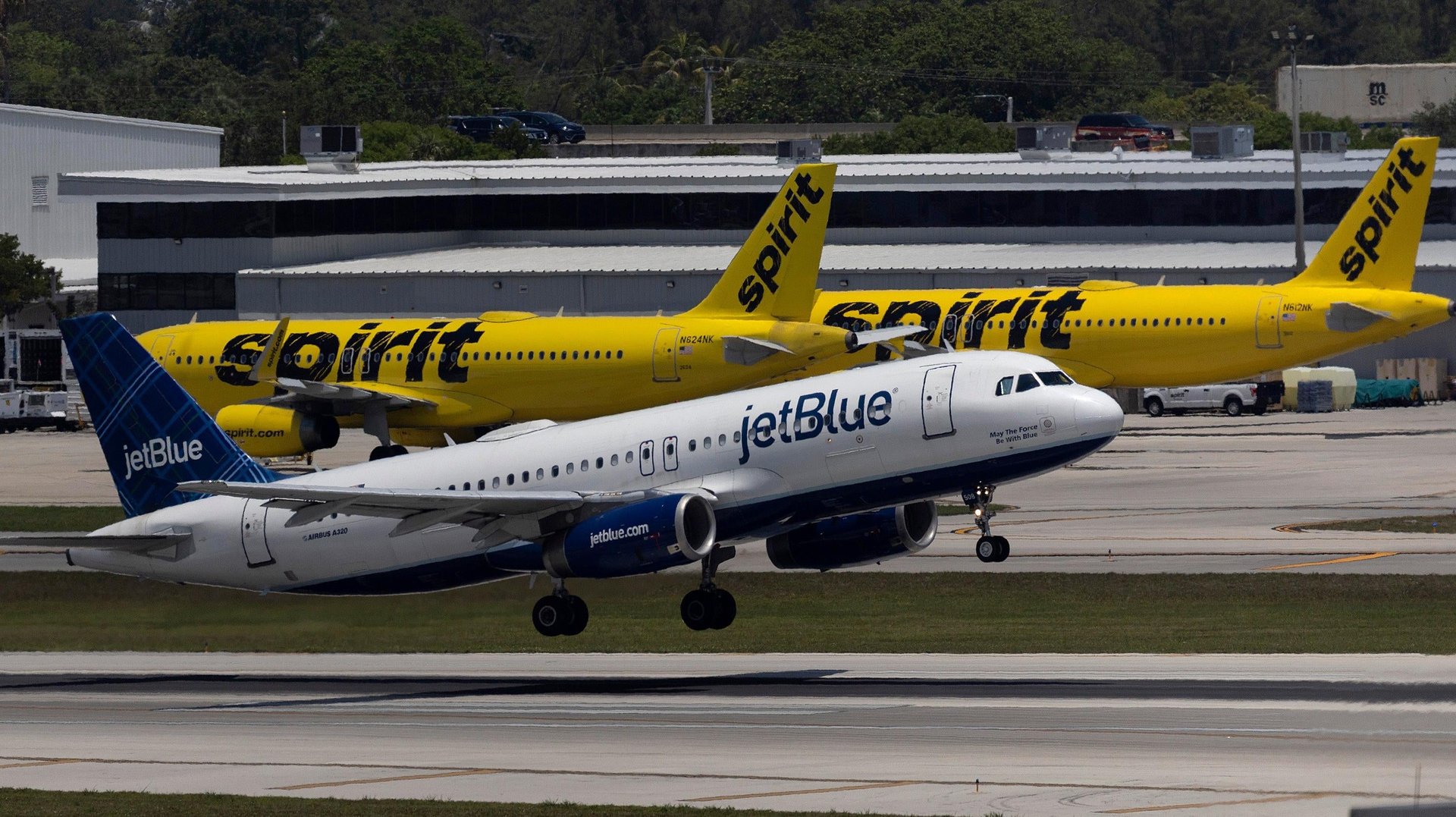The making of America’s fifth-largest airline faces a crucial shareholder vote
Spirit shareholders are scheduled to vote on JetBlue’s $3.8 billion acquisition offer on Oct. 19

JetBlue’s proposed merger with Spirit Airlines is about to face a crucial litmus test.
Spirit has scheduled a shareholder vote on JetBlue’s $3.8 billion acquisition offer for Oct. 19. The Florida-based airline said anyone who held stock in the company as of Monday, Sept. 12, is eligible to vote.
Both carriers’ boards of directors approved the bid almost two months ago. If Spirit shareholders also vote in favor, the deal only needs a final antitrust nod to go through. If all goes as planned, it’s expected to conclude in the first half of 2024.
The merger would create America’s fifth-largest airline at a time of recovery for the US industry. Despite rising fuel prices and hiring challenges, travel demand is strengthening as pandemic restrictions were lifted. Delta Airlines posted promising earnings last week, thanks to recovering travel. United, American, and JetBlue are next in line, posting results on Oct. 18, Oct. 20, and Oct. 25 respectively—and they are likely to benefit from similar revenue tailwinds.
By the digits
- 4: times Spirit delayed the vote on a $2.4 billion merger offer from Denver-based Frontier Airlines—made in February—before terminating talks in July (JetBlue made an unsolicited counteroffer in April)
- 77 million: combined customers for JetBlue and Spirit
- 1,700+: daily flights to more than 125 destinations in 30 countries the two can offer together
- 34,000: combined crew members
- 450 + 300: airline fleet and ordered jets, respectively
Charted: The making of America’s fifth-largest airline
Quotable
“Even combined with Spirit, JetBlue will still be significantly smaller than the Big Four, but we’ll be much better positioned to bring the proven JetBlue Effect to many more routes and locations.” —Robin Hayes, JetBlue CEO
Next antitrust steps
In a Sept. 15 letter to the Department of Transportation (DOT), Senator Elizabeth Warren said that moves like Delta acquiring Northwest in 2008, United acquiring Continental in 2010, and American merging with US Airways in 2013, have only hurt the industry. She urged the federal agency to block the Spirit-JetBlue merger, citing a number of concerns:
Consolidation is killing competition
This increased consolidation has contributed to the increase in delays, cancellations, and involuntary rebookings that airline passengers experience today. Consumer complaints to DOT have increased more than 300 percent from pre-pandemic levels, and air fares have outpaced inflation.
Next to no ultra-low cost carrier (ULCC) options
If the JetBlue-Spirit merger proceeds, it could pull Spirit out of the ULCC market altogether, leaving Frontier as the dominant market player at that price point. This elimination of ULCC competition in most domestic routes would be disastrous for consumers.
Outsize dominance in some airports and routes
The large degree of overlap between the two airlines’ routes and operating hubs means the greatest impacts on competition and fares will be felt in precisely the places where travelers currently rely on competition between Spirit and JetBlue the most.
Spirit’s poor service
[Spirit] often has the highest rate of flight cancellations and lowest on-time rate of any marketing carrier. Spirit, along with Frontier, has the least distance between seats (28”) of any carrier…Flight attendants unions have accused Spirit of being grossly unprepared to handle weather-related cancellation events, which have often resulted in “operational meltdowns” that left passengers and workers “stranded without answers.”
American airlines can’t consolidate so easily
JetBlue reportedly plans to overhaul Spirit’s existing fleet to offer more comfort, but pulling away from rock bottom prices and bare bones service will likely drive prices up. Especially since Spirit has so far served as an “anchor” in the market, pulling overall prices down. That could be reason enough for regulatory watchdogs to shut the deal down.
There is precedent for a tussle coming. In January 2021, the Trump administration approved an American Airlines and JetBlue alliance in the Northeast, which Biden’s administration is suing to break up, blaming the consolidation for creating an unholy trinity of “higher fares, fewer choices, and lower quality service.”
One more thing: Pilots want to be paid
Unionized pilots at Spirit are demanding pay parity and better working conditions before the deal draws to a close. Negotiations opened last month.
The Airline Pilots Association (ALPA) feels coming to an agreement before the merger would give captains and co-pilots further protection if and when the merger goes through, and it eliminates that need for prolonged negotiation with JetBlue at a later date.
As of January, Spirit’s 3,000 pilots earned less than JetBlue’s 4,000 across designations and tenures.